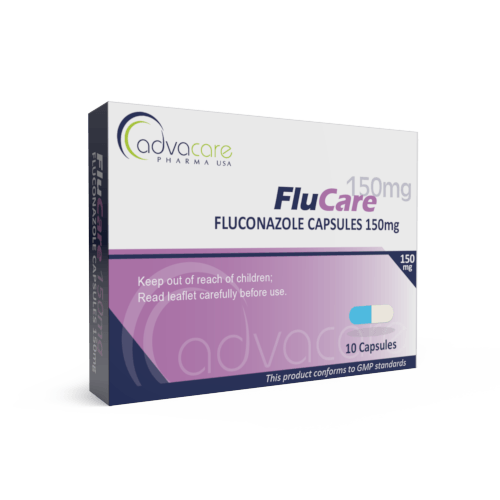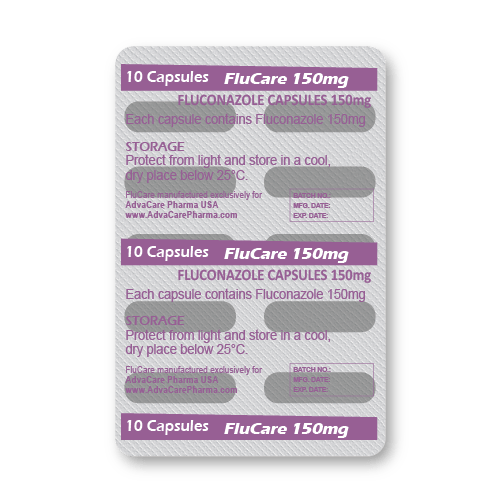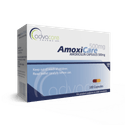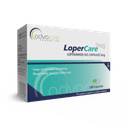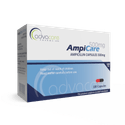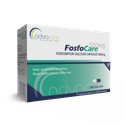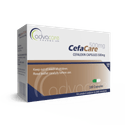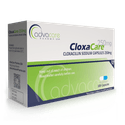- Home›
- Pharmaceuticals›
- Capsules›
- Fluconazole Capsules
Fluconazole Capsules
Dosage
Packaging
What is Fluconazole?
Active Ingredients: Fluconazole
Fluconazole Capsules are antifungal medications used to treat and prevent superficial and systemic fungal infections. Fluconazole is indicated for the treatment and prophylaxis of fungal infections where other antifungals have failed or are not tolerated. This drug is also used to prevent fungal infections in immunocompromised patients.
Fluconazole is a small molecule, synthetic antifungal triazole that belongs to the fluorobenzene class of organic compounds and was initially approved by the FDA in 1990. It has fungistatic activity against Candida and Cryptococcus species by inhibiting their growth through steroid inhibition that interferes with the synthesis and growth of cell walls and cell adhesion. Fluconazole is a highly selective inhibitor of the fungal cytochrome P450-dependent enzyme lanosterol 14-α-demethylase. The free nitrogen on fluconazole’s azole ring binds with an iron atom in the heme group of lanosterol 14-α-demethylase to inhibit the demethylation of lanosterol and the synthesis of ergosterol. Methylated sterols then accumulate in the fungal cellular membrane and negatively affect its structure and function, leading to fungal growth arrest.
Fluconazole is primarily used to treat infections caused by Candida and Cryptococcus fungi in the genitourinary tract, upper gastroenteric tract, meninges, and peritoneum. It is also available as a tablet dual-therapy with tinidazole for the treatment of fungal and bacterial vaginal infections and on its own as an injection in cases where patients cannot take fluconazole orally.
AdvaCare Pharma is a trusted global exporter of Fluconazole Capsules. This medication is produced in our facilities in China, India, and the USA. Our manufacturing facilities comply with WHO guidelines and standards, and we regularly inspect these facilities to ensure they meet these high standards.
Why are we a quality Fluconazole manufacturer?
AdvaCare Pharma is a GMP manufacturer of Fluconazole Capsules. Our strategically located facilities ensure that our company has complete control over the supply chain, meaning higher quality products and lower costs for production, transportation and importation. Over the past 20 years, we have built a solid reputation as a leading Fluconazole manufacturer, one of the 60+ products we manufacture in capsule dosage form, across 65 countries where our pharmaceutical products are distributed.
Uses
What is fluconazole used for?
Fluconazole is indicated for the treatment and prevention of:
- genitourinary infections caused by Candida (vaginal candidiasis and urinary tract infection)
- oropharyngeal and esophageal candidiasis
- candida peritonitis
- systemic Candida infections, including candidemia, disseminated candidiasis, and pneumonia
- cryptococcal meningitis
How are Fluconazole Capsules used?
This medication is manufactured to be taken orally. It should be taken once a day, with or without a meal.
What dose should be taken and how often?
Adults Dosage may vary based on different medical indications:
- For uncomplicated vaginal candidiasis, the recommended dose is a single dose of 150mg fluconazole. For complicated infections, the recommended dose is 150mg, taken every 72 hours for three doses.
- For oropharyngeal candidiasis, the recommended dose of fluconazole is 200mg on the first day, followed by 100mg once daily. The duration of treatment should be at least 2 weeks.
- For esophageal candidiasis, the recommended dose is 200mg on the first day, and then 100mg once daily. A maximum dose of 400mg/day may be used, based on the patient’s response to therapy. The duration of treatment should be at least 3 weeks and continue for 2 weeks after the symptoms have resolved.
- For urinary tract infections or peritonitis caused by Candida, the recommended daily dose is 50-200mg.
- For cryptococcal meningitis, the recommended dose is 400mg on the first day, and then 200mg once daily. A maximum dose of 400mg/day may be used, based on the patient’s response to therapy. The duration of treatment should continue at least 10 to 12 weeks after cerebrospinal fluid cultures are negative. For the suppression of relapse in patients with AIDS, the recommended dose is 200mg once daily.
- For systemic Candida infections, including candidemia, disseminated candidiasis, and pneumonia, the recommended therapeutic dosage and therapy duration have not been established. Limited human studies suggest doses of up to 400mg daily can be used.
- For prophylaxis in patients undergoing bone marrow transplantation, the recommended daily dose is 400mg.
Children (6 months - 17 years) Recommended dosage for children may vary based on different medical conditions:
- For indications where the recommended adult dose is 100mg, the pediatric dose is 3mg/kg.
- For adult doses of 200mg, the pediatric dose is 6mg/kg.
- For adult doses of 400mg, the pediatric dose is 12mg/kg.
Doses exceeding 600mg/day are not recommended.
The exact dosage is dependent on a patient's medical condition, response to the treatment, age, and weight. Refer to a doctor or pharmacist for guidelines on dosage. Do not exceed what they advise.
Who can use Fluconazole?
Fluconazole can be taken by adults and children, but caution is advised for specific groups of patients.
Pregnant For the treatment of vaginal candidiasis, fluconazole is a category C pregnancy risk.
For all other indications, fluconazole is a category D pregnancy risk.
There are no sufficient studies of fluconazole use in pregnant people. Current human studies do not suggest a negative impact on the fetus after single or multiple doses of the standard dose (< 200mg/day) in the first trimester, but several cases of rare congenital anomalies were reported in infants exposed to high doses of fluconazole (400-800mg/day) during the first trimester. Similar findings were observed in animal studies.
Fluconazole use during pregnancy is not advised except in patients with life-threatening fungal infections where the potential benefit outweighs any possible risk to the fetus.
Nursing After a single dose, fluconazole is secreted in breast milk at doses lower than the recommended pediatric dose. There are no data on repeated use or high doses of fluconazole while nursing.
Caution should be exercised when taking fluconazole while nursing.
Pediatric The recommendations for dosage adjustments for children are as follows:
- In pediatric patients < 6 months old, the efficacy of fluconazole use has not been established, but a small number of patients (29) aged 1 day to 6 months have been treated safely. Fluconazole is usually not the first line treatment.
- In pediatric patients aged 1 day to 17 years, fluconazole was found to be effective in treating various Candida and Cryptococcus infections with safety profiles comparable to those seen in adult studies.
Geriatric Studies with adults ≥ 65 years old are inconclusive on whether they respond differently than adults < 65 years old. There was no consistent difference in reported side effects between older and younger patients. Due to the likelihood of decreased renal function in older patients, the dose should be adjusted based on creatinine clearance, and renal function monitoring is encouraged.
Is Fluconazole effective in treating infections caused by bacteria or other microorganisms besides fungi?
Fluconazole is specifically designed to treat fungal infections and unfortunately does not show efficacy against bacterial infections or any other microbial agents. Its mechanism of action is specifically aimed at inhibiting the synthesis of ergosterol, a fundamental component of the cell membrane of fungi. Consequently, fluconazole lacks antibacterial properties and is not designed to combat bacterial pathogens. Therefore, in bacterial infections, an alternative antibacterial treatment is needed, since the therapeutic effects of fluconazole are limited to fungal adversaries.
Other warnings
In patients with renal insufficiency, fluconazole should be administered with caution.
Rare cases of serious and potentially fatal hepatic toxicity have been associated with fluconazole use. Fluconazole-associated hepatotoxicity has usually resolved with discontinuation of therapy.
Caution should be exercised when administering fluconazole to patients with hepatic insufficiency and liver function should be monitored during treatment. If potential signs and symptoms of liver disease develop, fluconazole should be discontinued.
Cases of exfoliative skin disorders with the potential for fatal outcomes in patients with serious underlying diseases have been associated with fluconazole use. Patients with fungal infections who develop rashes during fluconazole treatment should be monitored closely and therapy should be discontinued if rashes worsen.
Caution should be exercised when treating patients with potentially proarrhythmic conditions with fluconazole. Rare cases of QT prolongation and Torsade de Pointes have been reported in patients taking fluconazole. Most cases were in seriously ill patients with multiple risk factors. Patients with hypokalemia and advanced heart failure have a higher risk of developing life-threatening arrhythmias and Torsade de Pointes. Concomitant use of erythromycin is contraindicated, as it may also increase the risk of potentially fatal cardiotoxic events.
Side Effects
As with all pharmaceuticals, some unwanted effects can occur from the use of Fluconazole Capsules.
Common side effects include, but may not be limited to:
- headache
- abdominal pain
- nausea
- vomiting
- diarrhea
Seek medical attention if the following develop:
- sudden wheezing
- severe skin reactions
- itching all over the body
- loss of appetite or weight loss
For a comprehensive understanding of all potential side effects, consult a medical professional.
If any symptoms persist or worsen, or you notice any other symptoms, please call your doctor.
Precautions
Do NOT use Fluconazole Capsules if:
- You are allergic to fluconazole or other antifungal medications.
- You are taking astemizole or terfenadine.
- You are taking cisapride.
- You are taking pimozide.
- You are taking erythromycin.
- You are taking quinidine.
Alcohol should be avoided, as it may worsen the adverse effects caused by fluconazole.
Occasional dizziness or seizures may occur and should be considered when operating heavy machinery.
There are other known potential drug interactions with fluconazole. Consult with a doctor or pharmacist about any medications and supplements you are taking before treatment with fluconazole.
References
Maintenance Fluconazole Therapy for Recurrent Vulvovaginal Candidiasis
This research was made in order to find a safe and convenient regimen for effective treatment and management of recurrent vulvovaginal candidiasis. This trial included 387 women with recurrent vulvovaginal candidiasis that received fluconazole in doses of 150mg, at 72-hour intervals. The main measure was the proportion of women in clinical remission at the end of the first 6-month period. The vaginal mycologic status was also measured based on the basis of Kaplan-Meier analysis.
During the study, 90.8%, 73.2%, and 42.9% of the women remained disease-free at 6, 9, and 12 months of the study respectively. The placebo group had much less effect, 35.9 percent, 27.8 percent, and 21.9 percent, at 6, 9, and 12 months of the study respectively. The median time to clinical recurrence in the fluconazole group was 10.2 months, as compared with 4.0 months in the placebo group (P < 0.001).
The conclusion of this study is that long-term weekly treatment with fluconazole can reduce the rate of recurrence of vulvovaginal candidiasis.
You might be interested in...
Why AdvaCare Pharma?
As an industry leader, we are aware of our responsibility to provide affordable and sustainable solutions to improve healthcare worldwide.
